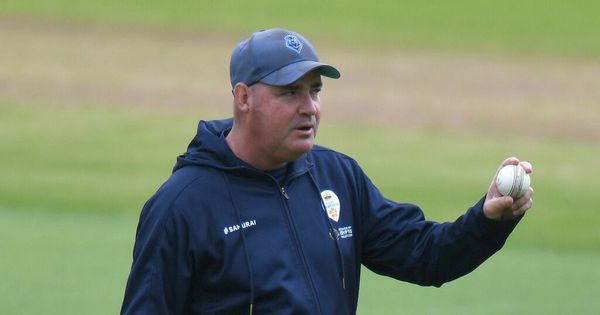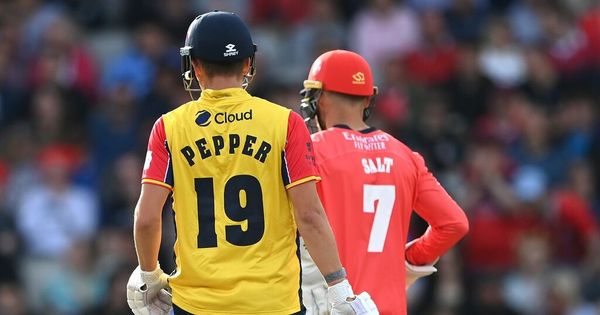“It’s an extraordinary life,” says Paul Edwards, reflecting on the past 30 years.
The cricket writer - and former left-arm spinner for Southport & Birkdale - has a book out next week, a collection of his work for Cricinfo, The Cricketer and other outlets over the past three decades.
Summer Days Promise features reports from matches big and small - from Ben Stokes’ Headingley epic in 2019, to Chorley v Littleborough as cricket began to emerge from the shadow of Covid the following year.
But it’s more than just a summary of who hit the ball where off whom. Anyone who’s read one of Edwards’ reports will recognise his signature lyrical style and narrative flow, studded with literary references and vignettes from a life spent loving cricket.
It comes as no surprise to learn that the longer forms of the game are the heart of his career.
“If you do a one day game, it’s so intense,” he says. “It’s so packed into three hours of action if it's a T20 match, or seven hours if it's a one dayer.
“But in a four-day match you get time to see the game develop, to see players react under different pressures, to see them over six hours or eight hours of an innings.
“What you also get is the chance to look at the context - you look at the surroundings, and you get the chance to write about trees and buildings and other things that have taken your fancy.
“In a sense, the cricket becomes the context for other things.”
Cricket, more than any other sport, is a numbers game, whether it’s Bradman’s 99.94 or Laker’s 19/90. Modern data journalism has taken that to an extreme with WinViz and XAve and Match Impact Scores.
Edwards prefers to think of the people, and their stories.
He says: “I think some of it is produced by people who count things because they don't feel anything, because they forget that they're actually people playing these shots.
“I think the point about data is that it's a bit like literary theory. It’s useful, but it does not explain of itself a poem or a novel.
“The fact that you know there is a psychoanalytic reading of a novel doesn't prevent there being others.
“In the preface to the book, George Dobell says Paul isn't the sort of person who would spend hours on Statsguru in order to uncover some bizarre numerical feature of a cricketer.
“He’s right, I wouldn't. I tend to think about what sort of person they are.
“And that's the point of course, is that cricket appeals to poets and people who read poetry, because of all sports, It is the most revelatory of character.
“And of course, four-day cricket takes such a long time, that you've got more opportunities to see the characters reveal themselves.”
A teacher by trade, Edwards was born in Sussex but moved to the North West at a young age.
Much of his story is set at Trafalgar Road, where he cut his teeth writing S&B match reports for the Southport Visiter - which he still does to this day.
“The last thing I write will probably be a report on S&B for the Southport Visiter, before senility finally claims me,” he says.
A few “strokes of luck” later, he was covering matches for the Guardian as well as writing about the Liverpool Competition for the Daily Post, under sports editor Richard Williamson, and later the ECHO.
He adds: “Richard gave me enormous encouragement.
“I knew nothing. I mean, really, I was so naive, it was pathetic.
“I started writing previews because Richard went on holiday. And when he came back, I just kept on filing them. And he said, are you going to carry on doing these?”
He covered the 2009 Ashes for the Post, rubbing shoulders with writers he’s always admired such as Gideon Haigh, the late David Foot and Dobell.
The matches he’s chosen for Summer Days Promise include two at Southport - where Lancashire return next week, to face Somerset in the LV= County Championship.
One was the most recent first-class game there, in which Dane Vilas and Josh Bohannon put on an unbeaten 139 to seal a remarkable four-wicket win over Worcestershire; the other came two summers previously, when Stokes and his Durham teammates wrapped up a two-wicket win then stayed behind on the outfield to knock a ball around with some spectators.
He says: “I thought, this is exactly what county cricket on an outground can do.
“That's what I like, that connection, and that is where my colours will always be nailed.
“People have said I'm more at home with a county match than with a Test match, and it's true. I absolutely am, because I'm interested in the regional context.
“No-one can tell you can't understand a lot about character from a Test match, you can understand a great deal - but I think county matches are richer in that sense.”
Another fond memory is of a game at Aigburth in 2019, when Leicestershire’s Paul Horton - once of Lancashire, and playing in his home city - batted most of the day to secure a draw for his side.
“It was a really slow day, but of course I loved it,” Edwards says. “When everyone is thinking ‘this is so slow,’ I'm thinking ‘this is great’.
“Paul made 49 and Leicestershire got a draw out of that game. And I thought, this is a lad who went to school down the road.
“He was the only first-class cricketer that I’d written about when I first became a professional, and who I played against.
“So I thought, this is an interesting story. This is a lovely Liverpool story, because Paul’s very loyal to Liverpool, it’s very much his patch. And I thought, let's write it.
“And then when I was thinking what pieces I would like to go into this book, that appealed.”
There’s no sense of doom and gloom, even when his musings veer towards wistfulness, but Edwards does fear for the future status of his beloved Championship.
He says: “I think four-day county cricket is fundamental to the development of the skills that people need, even in white-ball cricket.
“And I am worried that the County Championship will be relegated by people who do not understand the consequences of what they might be doing.
“If you reduce the county championship to, say, 10 games, there's at least two games most seasons that are wrecked by the weather. And I think you'll end up not playing enough red ball cricket.
“I think there is plenty of room in the English season for 14 four-day matches.
“I've got no problem with T20 cricket or the Royal London Cup, but anyone who would devise a cricket season and have two effectively 20 over competitions that are in competition with each other would be dismissed as insane.
“Unless they address the clash between those two and think about how that can be adjusted, they will be failing to meet one of the main problems, which is a packed schedule.
“The schedule is not packed because of 14 four-day games - it's packed because of an excess of short-form cricket.”
One of Edwards’ abiding passions is watching players develop from the club game, through to county level and beyond.
He recalls a cover drive played by a 16-year-old Haseeb Hameed in a Lancashire 2nd XI game at Southport as “one of the most moving experiences” in his career.
He says: “I think it helps to have played at his highest standard as you possibly can, so you know how quick the game can be.
“I bowled to very, very good cricketers, including some who played Test cricket and these are seriously good players.
“You learn a lot. You learn where they hit the balls and so on, and you learn to look at footwork.
“And people's character, their doubts, their certainties, their understanding of themselves or lack of it, will always be crucial determining factors in how well they play.”
As long as there are characters to follow, and stories to tell, Edwards has no intention of drawing stumps on his writing career just yet.
“I've got no intention of packing it in while I still find it so fulfilling to see those players develop,” he says.
- Summer Days Promise by Paul Edwards is published by Fairfield Books on July 14, priced £22. Copies will also be on sale during the Lancashire v Somerset match at Trafalgar Road, which starts on Monday.










